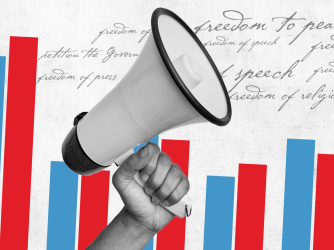Table of Contents
FIRE to Supreme Court: Protect the right to advocate for civil disobedience
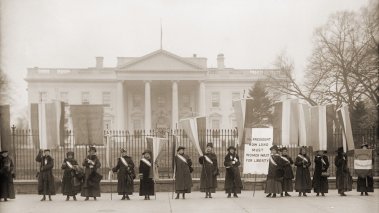
Everett Collection / Shutterstock.com
National Women's Party demonstration in front of the White House in 1918. The banner protests Wilson's failure to support women's suffrage.
Martin Luther King Jr. famously argued in his “Letter from Birmingham Jail” that there is a “moral responsibility to disobey unjust laws,” as he encouraged others to violate Jim Crow laws that required segregation. His call for civil disobedience led to lunch counter sit-ins, permitless marches, and more. His speech changed public opinion and put a glaring spotlight on the evils of racial discrimination.
It was also speech protected by the First Amendment.
To emphasize how crucial this type of advocacy is for our nation, FIRE partnered with the Rutherford Institute to file an amicus brief, co-authored by Rutherford and the University of Texas School of Law Supreme Court Clinic, in the Supreme Court of the United States in the case of United States v. Hansen. The brief supports a challenge to an overbroad federal law that puts the right to advocate for civil disobedience squarely in the government’s crosshairs.
The challenged law makes it a felony to “encourage or induce” another person to enter or reside in the United States unlawfully. But restricting this speech allows the government to put its thumb on the scale for a particular political idea and endangers advocacy that has played a vital role in the evolution of American democracy.
Based on First Amendment precedent and our nation’s history, FIRE urges the Supreme Court to affirm that overbroad speech restrictions criminalizing the encouragement of civil disobedience violate the First Amendment.
The brief explains how advocating for civil disobedience has been a regular feature of American history, dating as far back as the nation’s founding. From the Boston Tea Party to the abolition of slavery to the Women’s Suffrage and Civil Rights Movements, encouraging others to engage in civil disobedience is an American pastime that has been instrumental in exposing societal injustice and encouraging reform.
Abolitionists advocated for enslaved people to defy anti-literacy laws and flee from bondage. Frederick Douglass forcefully advocated for others to escape slavery, and in doing so violated laws in southern states that specifically criminalized this speech. And abolitionists more broadly encouraged northerners to refuse to comply with the enforcement of fugitive slave laws and to disobey the Supreme Court’s ignoble Dred Scott v. Sandford decision.
The Women’s Suffrage Movement campaigned for women to unlawfully register to vote and go to the polls. The movement advocated for civil disobedience at the polling place, even though suffragettes faced arrest and cruel treatment. Not only did this advocacy empower the women involved and mobilize supporters, it also enabled some women to challenge these discriminatory voting laws in the nation’s courtrooms.
The beginning of the Civil Rights Movement is defined in the nation’s memory by Rosa Park’s refusal to give up her seat, disobeying requirements that she sit in the back of the bus. Her courageous act ignited advocacy of further civil disobedience, by leaders such as Martin Luther King Jr. and former Rep. John Lewis, which eventually led to the end of Jim Crow segregation and the Civil Rights Act of 1964. Ironically, breaking the law paved the way for better laws.
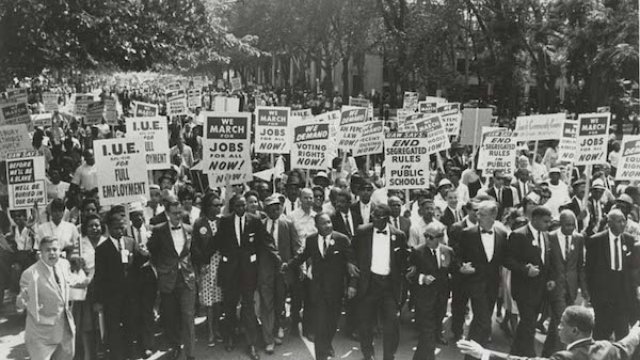
From protests to the Supreme Court: How the Civil Rights Movement advanced First Amendment legal protections
News
Peaceful protests not only appealed to the moral conscience of the average citizen but were also vehicles for advancing civil rights
Advocating for civil disobedience, as the brief explains, continues to this day. It has been central to debates over the government’s response to the COVID-19 pandemic. On the one hand, churches and other religious organizations advocated and engaged in large scale civil disobedience in the face of lockdown orders and ultimately prevailed at the Supreme Court. On the other, public school students advocated for walkouts to protest what they felt were inadequate safety measures and virtual learning opportunities.
Students have also recently advocated for walkouts to protest lax gun-control measures after a series of school shootings. Conversely, gun rights advocates have advocated for the refusal to register guns in opposition to what they see as oppressive registration requirements. Causes related to environmental protection, economic inequality, taxation, war, abortion, and animal rights, among others, have also included the advocacy of civil disobedience.
As these examples show, there is a deep and meaningful history of advocacy for civil disobedience drawing attention to what people see as serious injustice, and promoting their goals for social and political reform.
To be sure, some speech related to criminal acts is not within the First Amendment’s protections. But these categories are well-defined and narrow exceptions, like inciting others to engage in criminal acts or actually proposing to engage in criminality with others. The Supreme Court has used exacting language to limit these exceptions to speech that is “directed to inciting or producing imminent lawless action” and “likely to lead to lawless action,” or that makes a concrete “proposal to engage in illegal activity.”
In Hansen’s case, the challenged law sweeps far wider, making it a felony to advocate for another to commit low-level criminal or even civil offenses.
As FIRE’s brief explains:
[H]istorical and present-day protest movements confirm, encouragement of civil disobedience is a powerful tool for unifying citizens to push for social reform, calling attention to perceived societal injustices and promoting the public exchange of differing viewpoints. Criminalizing the mere encouragement of law breaking would unnecessarily chill protest speech that transforms individual acts into cohesive, national movements capable of forcing society at large to confront injustices within American democracy.
Based on First Amendment precedent and our nation’s history, FIRE urges the Supreme Court to affirm that overbroad speech restrictions criminalizing the encouragement of civil disobedience violate the First Amendment.
You can read FIRE and Rutherford Institute’s full brief here.
Recent Articles
FIRE’s award-winning Newsdesk covers the free speech news you need to stay informed.
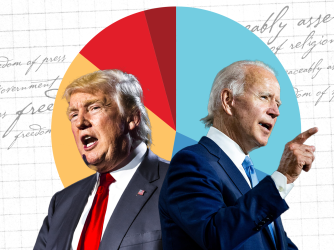
New FIRE poll: Americans equally skeptical Biden or Trump will protect First Amendment rights
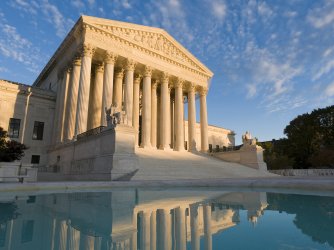
The 8 First Amendment cases the Supreme Court will decide this term

